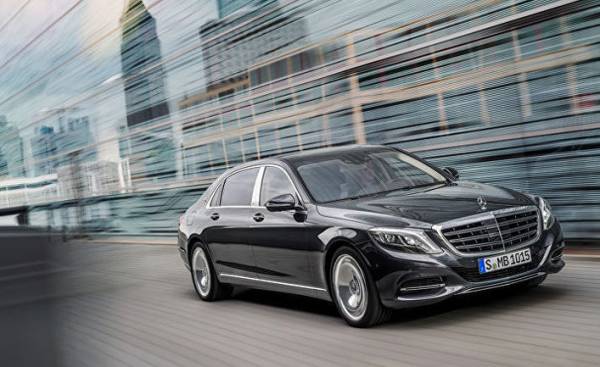
UK decided: in 2040 the sale of new vehicles with gasoline or diesel motors will be allowed. The same will apply to cars,”hybrids” with electric propulsion.
Thus the British join a number of other European countries have already decided on the date of parting with the engine. Along with Norway, has for many years played a leading role in the areas of electric vehicles and planning in 2025 at the local scale to allow for operation only cars that do not produce harmful emissions into the atmosphere earlier this month the Minister of ecology of France, Nicolas Hulot (Nicols Hulot) has announced that in 2040 will be a ban on the transport with petrol and diesel engines.
This list is important Chinese market where it will shortly be launched to clear the quota of electric cars that will also be a step in the same direction. In Germany so far only the “green” insist on the prohibition of the internal combustion engine in 2030. However, news from London, Paris and Oslo are forced to think about these measures and other politicians in Germany. “We will soon have to begin the process of parting with the technology of the internal combustion engine,” — said in a radio interview Wittke Oliver (Oliver Wittke), the Commissioner of the CDU on transport.
According to him, the point is not that the UK sets the tone, while Germany is lagging behind. But Berlin should, whenever possible, to coordinate actions in this field with its European partners and also to indicate the period when it is mandatory to abandon the internal combustion engine. When this would occur is not clear. But the representative of the Left party Hergert Behrens (Behrens Herbert) in an interview with ARD TV channel also demanded to set a date of refusal of transport that use liquid energy.
Germany does not want to ban gasoline
The government, however, wants to follow the example of the British. “The ban of a gasoline or diesel transport at the moment is not on the agenda of the government”, — said the Deputy representative of the government Demmer Ulrike (Ulrike Demmer). The representative of the Ministry of transport, in turn, criticized the requirement of a ban, because people who insist on it, according to him, do not take into account the results of relevant scientific research.
For example, the climate has not suffered any damage, even if the car consumed energy obtained from the combustion of brown coal. In addition, it is actually “climate balance” of electric vehicles is rather negative, because energy-intensive production of batteries there is a large amount of dioxide of coal that it is necessary to drive it tens of thousands of kilometers to the comparison with internal combustion engines having a relatively small CO2 emissions, came out in favor of the electric car.
The British are not afraid. The transition to the motors is the key point of the strategy of the local government to improve air quality, adopted after two claims of the environmental organization Client Earth. Future ban is complemented by a call to the local authorities to take immediate steps to improve air quality along the 80 most polluted motorways across the country, in particular, changes in traffic organization or retrofit buses. The package also includes a ban on the use of diesel vehicles in “rush hours”.
In London there is a problem with air quality
“Poor air quality is the biggest risk to the health of UK citizens, and this government is committed in the near future to take corresponding measures,” — said the Minister of ecology. In last year’s survey by the Royal College of physics States that air pollution in the country causes the death of about 40 thousand people per year.
So, in some areas of London, the allowable annual level of air pollution was achieved within one week. And on some days, it exceeds even the performance of “chronically” dirty Beijing. Glasgow is also included in the list of cities with particularly polluted air — to a large extent due to transport.
British environmentalists and the opposition criticized the announced measures, considering them insufficient. According to them, the government only postpones this serious problem indefinitely. “Timid promises from the government — it’s not enough,” said mayor Sadiq Khan (Sadiq Khan), representing the opposition labour party. “Londoners are suffering today, can’t wait till 2040”.
The plan can be made real with the transitional period
However, the planned transition period will be long enough, and it allows to consider the proposed plan seriously, said David Bailey (David Bailey), avtoekspert from the University of Aston in Birmingham in an interview with the Guardian newspaper. Producers and consumers will get, according to him, a clear signal about the direction in which we are working and will be able to tune in to “transplant” to electric vehicles. In turn, the Greenpeace activist Alima, Hamid (Areeba Hamid) called this situation a “flagrant swindle”. “This means that British children for many years will be forced to breathe dirty air, which is perhaps irreversible consequences.”
Caroline Lucas (Caroline Lucas), the only representative of the “green” in Parliament, welcomed the planned ban, but complained that it will be implemented “only partially and not soon enough”.
In the number proposed by the environment Minister Michael gavon (Michael Gove) measures also included funding for infrastructure development in the country. In addition, the government contemplates reward citizens for recycling the most polluting diesel cars. However, this aspect is discussed with restraint, especially since one of the previous governments under the leadership of Gordon brown recently advocated that diesel cars have lower CO2 exhaust compared to gasoline. Now the Cabinet seems to be problematic to explain to consumers that the vehicles for which the government advocated before, do not meet modern requirements to the content of nitrogen oxides in exhaust gases.
The British car industry warns of cuts
Meanwhile the British Union of manufacturers warned about some of the consequences of the decision in favor of the future of the ban. In the country in varying degrees associated with the automotive industry around 800 thousand jobs. According to the Chairman of the Union of House Mike (Mike Hawes), a lot will depend on the cost of new technologies, as well as from the willingness of consumers to deal with new technologies. “At the moment, really growing demand for alternative types of engines, but it is still relatively small, because consumers are not sure of the availability of this transport, the possibility of long-distance travel and the availability of charging stations”, — he stressed. Currently, less than one percent of all vehicles in the UK are electric.
Skeptical of the future ban of gasoline transport in the UK reacted and some automakers. “We have a clear strategy: we want to build the most exciting, the most delightful and most comfortable electric cars”, — said the head of Daimler Dieter Zetsche (Dieter Zetsche). “We want to convince the maximum possible number of customers and we believe this is the best way to promote electric vehicles”.
Critical of the ban and Karlon Tabares (Carlos Tavares), the head of the French group PSA, which soon will belong to the brand Opel. “Regardless of politics, we can say that there is a trend to electrification and zero emissions,” he said. Simultaneously, Tabares drew attention to the fact that in Europe, the automotive industry employs about 12 million people. “The question is that Europe is going to do with their automotive industry,” — said Tabares.
Other manufacturers, particularly Volvo, have already announced that from 2019 will not be put on the market new models, equipped only with internal combustion engines.







